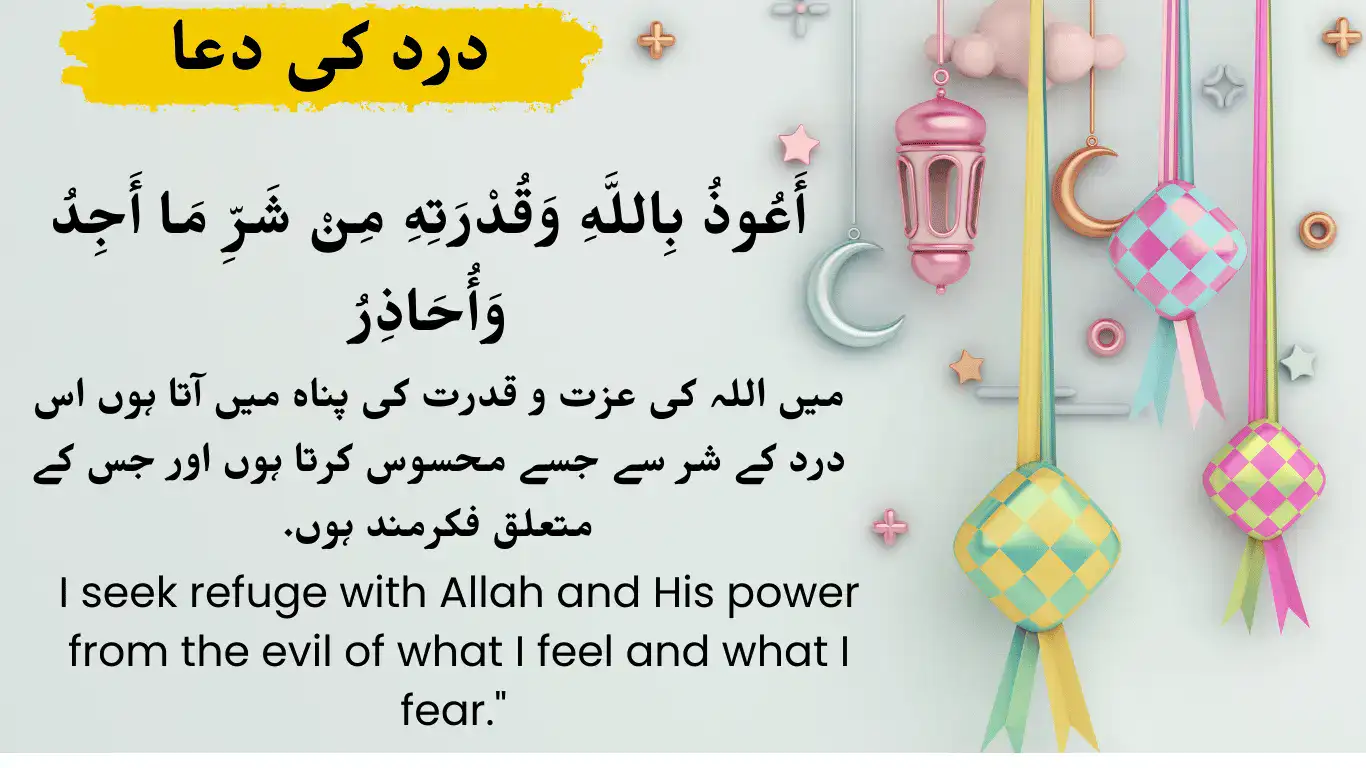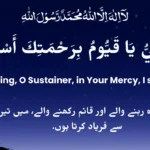Pain and discomfort, whether physical or emotional, are part of human experience. In such moments, many people turn to spiritual support to find relief. Dard ki dua (درد کی دعا), or a prayer for pain relief, is a powerful invocation used in Islamic tradition to seek protection from pain and fear. This dua, sourced from authentic Hadith, is a source of comfort for those seeking Allah’s refuge and strength in times of distress.
Let’s discuss the dua for pain relief one line at a time, its transliteration, and its Urdu translation for better understanding and connection with this powerful prayer.
| Maghfirat Ki Dua –Seeking Forgiveness |
| Bukhar Ki Dua –Relief from Fever | بخار کی دعا |
| Rizq Mein Barkat Ki Dua | دعاء رزق میں برکت |
| Karz Ki Dua (Prayer for Debt Relief) |
1. Arabic Verse and Transliteration
أَعُوذُ بِاللَّهِ وَقُدْرَتِهِ مِنْ شَرِّ مَا أَجِدُ وَأُحَاذِرُ
Transliteration: A’udhu billahi wa qudratihi min sharri ma ajidu wa uhadhiru
Translation (Urdu): ترجمہ: میں اللہ کی عزت و قدرت کی پناہ میں آتا ہوں اس درد کے شر سے جسے محسوس کرتا ہوں اور جس کے متعلق فکرمند ہوں
This dua translates to: “I seek refuge with Allah and His power from the evil of what I feel and what I fear.” It is a simple yet profound way to ask Allah for protection from the distress one is experiencing, be it pain or any fearful anticipation.
The Meaning and Significance of Each Phrase
This dua is brief but rich in meaning. Each phrase encapsulates a sense of reliance on Allah’s power and a plea for safety and peace.
Seeking Refuge in Allah’s Power
The dua begins with “A’udhu billahi wa qudratihi,” which means, “I seek refuge with Allah and His power.” This line emphasizes the believer’s reliance on Allah’s might. It reminds us that true strength comes from Allah, who alone can alleviate our suffering.
Protection from the Pain One Feels
The next part of the dua, “min sharri ma ajidu,” translates to “from the evil of what I feel.” Here, the word “shar” (evil) refers to the discomfort, pain, or harm that one is currently experiencing. By reciting this dua, one asks for relief from physical or emotional suffering.
Safety from What One Fears
The final phrase, “wa uhadhiru,” means “and what I fear.” Fear often accompanies pain, especially when the cause of pain is unknown or chronic. This part of the dua requests protection not only from current discomfort but also from any potential future suffering or anxiety related to it.
Why Recite This Dua for Pain Relief?
This dua serves as a reminder of faith and patience. When recited with sincerity, it fosters a sense of calm and reassurance, reminding the believer that Allah’s power can shield them from all forms of suffering. The act of turning to Allah in times of distress instills peace, even if the pain does not disappear immediately.
Benefits of “Pain Ki Dua” in Daily Life
Reciting this dua regularly can help in:
- Relieving Physical Pain: For physical pain, such as headaches or chronic ailments, this dua is a plea for Allah’s mercy.
- Calming Anxiety and Worry: The dua also addresses emotional pain by seeking protection from fears and anxieties, promoting mental peace.
- Strengthening Faith: When you rely on Allah in times of difficulty, it strengthens your iman (faith) and builds patience.
FAQs:
You can recite this dua whenever you experience physical pain or emotional distress. It’s particularly effective when feeling anxious or overwhelmed by fear.
There is no fixed number, but it is encouraged to recite it with sincerity and focus. Repeat it as often as needed to find comfort.
Yes, you can make dua for others as well. Pray with the intention that Allah grants them relief and protects them from their pain and fears.
Conclusion
In Islam, dua is a powerful tool to seek Allah’s help in every aspect of life, including relief from pain. “Dard ki dua” is a profound expression of trust in Allah’s power to heal and protect. By reciting this dua, you acknowledge your reliance on Allah for both present comfort and future safety. May Allah relieve everyone’s pain and grant peace and protection to all who seek it.




